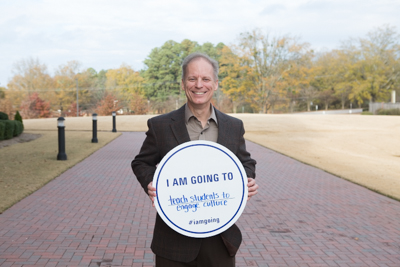Faculty Q & A with Ken Keathley
CHRIS MARTIN | January 19, 2017


Q: Tell us about yourself.
A: I was born in St. Louis, Missouri, and I was raised in the Ozarks in southern Missouri. I went to church and Sunday school often growing up, in a traditional Southern Baptist sort of setting. I was converted at a revival meeting at Tabernacle Baptist Church when I was 17 as a senior in high school and was called to the ministry at that time.
I went to school at an independent Baptist college in Chattanooga, Tennessee, worked for a number of years in the ministry, and did my graduate work at Southeastern. My wife Penny and I have two children and three grandchildren.
Q: How did you come to SEBTS?
A: While I was in the doctoral program at Southeastern, I went to teach at Midwestern Seminary. When I finished my dissertation, I received a call to be the Dean of Students at New Orleans Seminary. After Hurricane Katrina, which left five feet of water in my house, I received a call to come to Southeastern.
Q: When people ask you, “What do you do at Southeastern,” what is your response?
A: I am a Professor of Theology and the Director for the Bush Center for Faith and Culture. In teaching theology, my interests are in the doctrines of salvation, creation, and the theology of religions.
Q: On what are you currently working?
A: Mark Rooker and I have a book that just came out in November called “40 Questions on Creation and Evolution,” which is part of Kregel’s 40 Questions series. We are looking at a project I’d be the editor for called “Science, Scripture, and God’s Creation,” which would be a conversation between old-earth creationists and new-earth creationists.
Q: What have you been reading recently?
A: There’s a great book called “The Stories We Tell” by Mike Cosper that I’ve really enjoyed. Another one I just finished is call “Panentheism: The Other God of the Philosophers,” by John Cooper, which is for theology nerds.
Q: When you get home from work, what do you look forward to doing?
A: I’m a lifelong St. Louis Cardinals fan, and I enjoy watching baseball. I also enjoy progressive bluegrass like Nickel Creek. My wife and I go to a lot of concerts.
Q: Who are your role models?
A: Someone I really consider a role model is Billy Graham. The transparent way in which he has lived his life in the limelight is remarkable. He’s not perfect, but the way in which he lived the Christian life with such integrity is worth emulating.
Also, John Stott is someone I love reading and really admire. I also really appreciate Paige Patterson and Timothy George.
Q: What has God been teaching you lately?
A: He’s been teaching me that living life to the glory of God is a beautiful thing. Rather than attempting heroic things for God, one should attempt to live for his glory each day: that is heroic.
Q: Where are some of your former students?
A: Many of my students are now pastors. Several are professors in colleges and seminaries. I am also thrilled at the number of former students of mine who are missionaries. One of my students is now the leader of a Southern Baptist entity.
Q: When a student completes your class, what do you want him or her to walk away with at the end of the semester?
A: Other than a level of theological content, I also want there to be greater outcomes. My desire is that he or she to realize that they have just started the task of thinking Christianly. Hopefully, the class has equipped them with the tools for integrating Christian theology into every area of their lives and ministry. I would like them to be able to understand the role theology plays in every area of a Christian’s life.
Q: We always say that every classroom at SEBTS is a Great Commission classroom. What does that look like for your class?
A: To know the mission of God and join it. In theology classes, there has been a tendency to separate the heart and mind as well as activities and beliefs. Hopefully, what students get from a theology class at Southeastern is that belief and practice go hand-in-hand. Our beliefs direct our behaviors. Our behaviors reveal our beliefs. We must teach the mission of God and encourage them to live it out.